Navaneetham Padmanabha Seshadri | |
|---|---|
| Born | 2 January 1929 Kandiyur, Tamil Nadu, India |
| Died | 16 November 2009 (aged 80) New Delhi |
| Occupation | Musicologist |
| Years active | Since 1949 |
| Spouse(s) | Sakuntala |
| Children | 2 sons and a daughter |
| Parent(s) | N. S. Padmanabha Ayengar Lakshmi Sundari |
| Awards | Padma Shri Maya Award Tansen Award Tyagaraja Award Ashoka Mayur Award National Handloom Award Asian Cultural Award Hakim Khan Suri Award Kalai Kavalan Award Guruvayur Elephant Award Rashtriya Ekta Award |
| Website | Profile |
Navaneetham Padmanabha Seshadri, popularly known as N. P. Sheshadri, was an Indian musicologist, scholar, administrator [1] [2] and the founder secretary of National Cultural Organization. [3] He was known for his services for the promotion of Indian culture and heritage. [2] [4] [5] Seshadri was honored by the Government of India, in 2002, with the fourth highest Indian civilian award of Padma Shri [6]
Navaneetham Padmanabha Seshadri was born in a Tamil Brahmin family to N. S. Padmanabha Ayengar and Lakshmi Sundari at Kandiyur in the South Indian state of Tamil Nadu on 2 January 1929. [1] He graduated in commerce (BCom) and continued his education to secure a doctoral degree (PhD). [1] His career started in 1949 by joining the Ministry of Commerce and Industry where he, later, became the economic investigator, a first time appointment by the Planning Commission of India, in 1950. [1] He stayed in that post till 1953 during which time he was involved in organizing exhibitions related to the five year plan under the Ministry of Information and Broadcasting. [1] In 1953, he was transferred to the National Cooperative Development Warehousing Board for a three year term and in 1956 to 1957, he worked at the Publicity and Information Division of the Planning Commission. In 1958, he was appointed as the deputy director of the Song and Drama Division of the Ministry of Information and Broadcasting.
1968, he moved to the Cultural, Protocol and Trade Promotion Division as a joint director and in 1972, he took charge of the Asia '72, present day India Trade Promotion Organization, [7] [8] event of the Ministry of Commerce where he stayed till 1975. The next two years were spent at Planning Commission as a deputy director and in 1977, he was appointed as the joint development commissioner of the Handlooms Export Promotion Council (HEPC) [9] under the Ministry of Commerce, a post he held till hs retirement from the government service. [1] Seshadri served as the cultural advisor to the Trade Fair Authority for Agri Expo of 1977. [1] He was the secretary of All India Music Society during 1949-50, was a member of the Bharati Centenary Celebration Committee in 1979 and was involved in the organization of Handloom Pavilion in Moscow in 1978. [1]
Seshadri was known for his efforts for the promotion of Indian culture and heritage. [2] He founded the National Cultural Organization (NCO) [5] in 1950, inaugurated by the then Prime Minister of India, Jawaharlal Nehru. [4] [3] Under the aegis of this organization, he organized many cultural festivals in Delhi, such as the Tansen Festival, Thyagaraja Festival, Purandaradasa Festival and Bharati Festival. [7] [8] His contributions have been reported in popularizing Indian handloom. [2] During his tenure as the joint development commissioner of HEPC, he introduced the Janata Sari and Janata Dhoti , selling the garments through HEPC outlets, at ₹15 (US$0.30) apiece. [7] [4] His efforts were also reported behind the drive to popularize Indian tea during his stint as the director of the Tea Promotion Council; his presentation of a packet of Indian tea to Lady Diana have been written about by the media. [7]
Seshadri died on 16 November 2009, aged 81, [4] succumbing to old age illnesses, [7] leaving behind his wife, Sakuntala, two sons, N. S. Parthasarathy and N. S. Padmanabhan, and daughter Raji Gopalan. [1] [7]
Seshadri received Maya Award from the Guild of Architects in 1978 and the first Mian Tansen Award from the Dhrupad Society in 1979, [1] followed by other awards such as Tyagaraja Award, Ashoka Mayur Award, National Handloom Award and Asian Cultural Award. [2] He is also a recipient of Hakim Khan Suri Award, Rashtriya Ekta Award, Kalai Kavalan Award, Puradaradasa Award and Guruvayur Elephant Award. The Government of India honoured Seshadri in 2002 with the civilian award of Padma Shri. [2] [7]
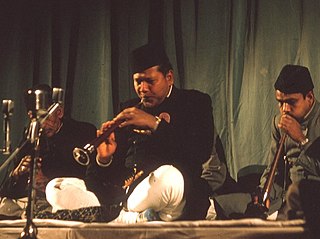
Bismillah Khan, often referred to by the title Ustad, was an Indian musician credited with popularizing the shehnai, a reeded woodwind instrument. While the shehnai had long held importance as a folk instrument played primarily schooled in traditional ceremonies, Khan is credited with elevating its status and bringing it to the concert stage.

Ustad Amjad Ali Khan is an Indian classical sarod player, best known for his clear and fast ekhara taans. Khan was born into a classical musical family and has performed internationally since the 1960s. He was awarded India's second highest civilian honour Padma Vibhushan in 2001.
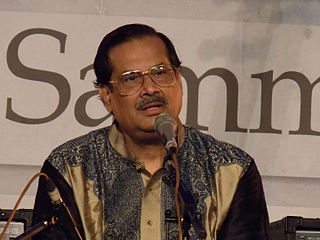
Pandit Ajoy Chakrabarty is an Indian Hindustani classical vocalist, composer, lyricist and gurudev of the Patiala-Kasur gharana. He is considered to be one of the proverbial figures of Indian classical music. He has also dominated for other major classical genres of India especially—Indore, Delhi, Jaipur, Gwalior, Agra, Kirana, Rampur and even Carnatic music in South India. He was given Padma Bhushan Award, the third highest civilian award in India in 2020.

Abid Hussain was an Indian economist, civil servant and diplomat. He was India's ambassador to the United States of America from 1990 to 1992 and a member of the Planning Commission from 1985 to 1990.
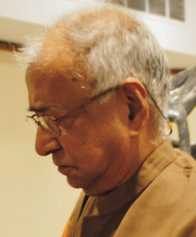
Kalpathi Ganpathi "K.G." Subramanyan was an Indian artist. He was awarded the Padma Vibhushan in 2012.
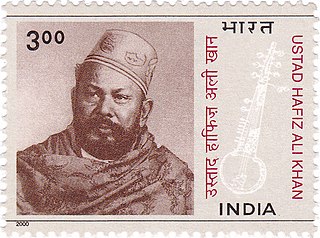
Hafiz Ali Khan (1888–1972) was an Indian sarod player. A fifth-generation descendant of the Bangash gharana of sarod players, Hafiz Ali was known for the lyrical beauty of his music and the crystal-clear tone of his strokes. The occasional critic has, however, observed that Khan's imagination was often closer to the semi-classical thumri idiom than the austere dhrupad style prevalent in his times. He was a recipient of the civilian honour, the Padma Bhushan Award, in 1960.

Gajam Anjaiah, an Indian master handloom designer, who is widely recognised in the handloom industry for his innovations and developments of Tie and Dye handloom products along with Telia Rumal technique of weaving based on Ikat tie-dye process. He received Padma Shri from Government of India under Art category in 2013. He is known for his excellence in traditional handloom design works, such as Puttapaka Sarees in Tie and dye skill, that is the traditional art of designing on paper and then transferring it on to cloth. His dedication to the Handloom Industry has kept the Indian tradition of weaving alive, brought livelihood to the weavers and gave exclusive/unique designed handloom products to the people in India.

Kailash Chandra Meher is an Indian artist, inventor, and social activist. He is a painter of contemporary modern art paintings and traditional Tussar Pattachitra paintings of Odisha. He was a recipient of the Padma Shri by the Government of India in 2013.

Shanno Khurana is a noted Indian classical vocalist and composer, from the Rampur-Sahaswan gharana of Hindustani classical music. A disciple of the doyen of the gharana, Ustad Mushtaq Hussain Khan, she is known for performing rare bandish and raag, though her singing style includes genres like khayal, tarana, thumri, dadra, tappa, to chaiti and bhajan. Born and brought up in Jodhpur, she started singing on All India Radio in 1945 in Lahore, later shifted to Delhi, where she continued her singing on All India Radio, Delhi and in concerts and music festivals. She also pursued music education, finally earning her M.Phil. and PhD in music from the Kairagarh University, and has undertakes extensive research on folk music of Rajasthan.
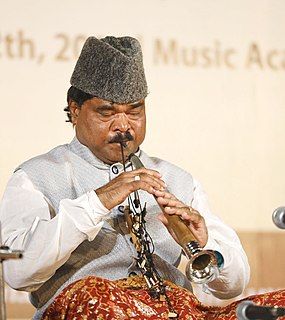
Pandit Dr. S. Ballesh, born Ballappa Sanna Bharamappa Bhajantri and also known as S. Ballesh Bhajantri on 1 April 1958) is an Indian classical Hindustani shehnai player. One of the most well-known disciples of shehnai player Bharat Ratna Ustad Bismillah Khan, he is an expert in Benares gharana shehnai playing, and a Patiala gharana Hindustani vocalist, ghazal singer, Indian Playback singer and musician, often referred by the title Panditji and BadeGuruji. Ballesh is credited with popularizing the shehnai, a reeded woodwind instrument. While the shehnai had long held importance as a folk instrument played in traditional ceremonies in India, Ballesh is credited with elevating its status and bringing it back to the centre stage. He plays often for Prasar Bharati's All India Radio (AIR) and Doordarshan.
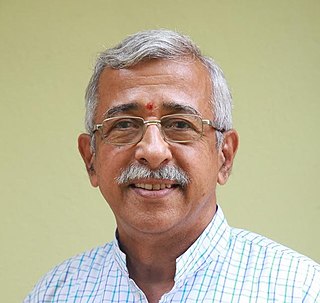
Chamu Krishna Shastry is an Indian Educationist who has been working for the revival of the Sanskrit language. He is the trustee and Secretary of Samskrit Promotion Foundation. He is also the co-founder of Samskrita Bharati. Now he is spearheading a movement to teach Sanskrit Through Sanskrit On 25 January 2017, Government of India announced "Padma Shri" award in the category Literature and education. for his contribution towards the promotion of Sanskrit.
Rita Ganguly is an exponent in the Indian classical arts. An accomplished dancer, musician and vocalist, she was honoured with the Sangeet Natak Akademi Award in 2000 and with the Padma Shri in 2003. She is the mother of actress Meghna Kothari and the of younger sister of the famous Ravindra Sangeet singer Gita Ghatak.
Jadunath Supakar was an Indian artist and textile designer. He was born in 1931 in Sambalpur in the Indian state of Odisha and was known for his contributions for the popularization of handloom industry of Varanasi. He was a recipient of the Odisha Lalit Kala Academy Award and his creations have been exhibited in several countries. The Government of India awarded him the fourth highest Indian civilian honour of Padma Shri in 1985. His son, Sribhash Chandra Supakar, is also a textile designer and a national award winner.
Padmanabhan Gopinathan is an Indian master weaver of handloom textiles and the founder of Eco Tex Handloom Consortium, an organization promoting handloom weaving in Manjavilakom, a small hamlet in Thiruvananthapuram, in the south Indian state of Kerala. Under the aegis of the organization, he provides employment to over 1800 women in the village. The Government of India awarded him the fourth highest civilian honour of the Padma Shri, in 2007, for his social commitment and his contributions to the art of weaving.
Gaan Maharishi Pt. Krishnarao Shankar Pandit (1893–1989) was an Indian musician, considered by many as one of the leading vocalists of the Gwalior gharana. He authored several articles and 8 books on music and was the founder of Shankar Gandharva Mahavidyalaya, a music college based in Gwalior. The Government of India awarded him the third highest civilian honour of the Padma Bhushan, in 1973, for his contributions to music. He was also a recipient of several other honors, including the 1959 Sangeet Natak Akademi Award and the 1980 Tansen Award of the Government of Madhya Pradesh.
N. Srinivasa Iyer Ramaswamy (1926–2012), popularly known as Cartman Ramaswamy, was an Indian engineer, educationist, management academic and writer, and the founder director of the Indian Institute of Management, Bangalore. He was the founder of Centre for Action, Research and Technology for Man, Animal and Nature (CARTMAN), a non governmental organization working for region-relevant and appropriate technology transfer to rural areas and Indian Heritage Academy, an organization involved in propagating Indian cultural traditions. He was also the founder chairman of the Adarsh Vidya Kendra (AVK) Group of educational institutions. The Government of India awarded him the third highest civilian honour of the Padma Bhushan, in 2006, for his contributions to society.
Suresh Kumar Neotia (1936–2015) was an Indian industrialist, entrepreneur, art collector, philanthropist and the co-founder of Ambuja Cements and associated companies. He was the chairman of the Group till 2009 when he relinquished the position in favor of his co-founder, Narotam Sekhsaria, and remained as the Chairman Emeritus of the Group until his death. He was a recipient of Harvard Business School - Economic Times Award and was involved in many social activities which included the promotion of cultural organizations such as Anamika Kala Sangam and Padatik. The Government of India awarded him the third highest civilian honour of the Padma Bhushan, in 2008, for his contributions to trade and industry.
S. K. Misra is a retired Indian civil servant, social worker, writer and a former Principal Secretary to Chandra Sekhar, the 8th Prime Minister of India. He served as the principal secretary to three chief ministers of Haryana and is a former secretary at the ministries of Tourism, Civil Aviation and Agriculture. He is one of the founders of Motilal Nehru School of Sports, Rai and the founder chairman of Indian Trust for Rural Heritage and Development. The Government of India awarded him the third highest civilian honour of the Padma Bhushan, in 2009, for his contributions to Indian civil service.
Gobardhan Panika is an Indian master weaver of Kotpad handloom a traditional tribal craft. The Government of India awarded him the fourth highest civilian honour of the Padma Shri, in 2018, for his contributions to the art of weaving.